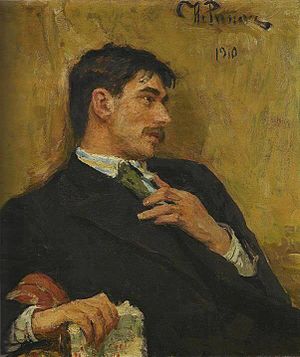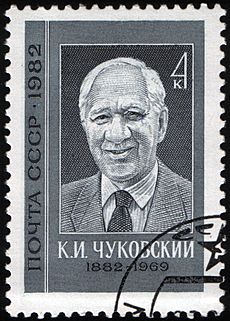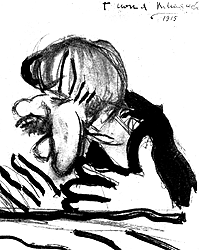Korney Chukovsky facts for kids
Quick facts for kids
Korney Chukovsky
|
|
|---|---|

Portrait by Ilya Repin.
|
|
| Born | Nikolay Vasilyevich Korneychukov 31 March 1882 Saint Petersburg, Russian Empire |
| Died | 28 October 1969 (aged 87) Moscow, Russian SFSR, Soviet Union |
| Occupation | Poet, writer, translator, literary critic, journalist |
Korney Ivanovich Chukovsky (Russian: Корне́й Ива́нович Чуко́вский; 31 March 1882 – 28 October 1969) was a very popular children's poet in the Russian language. His poems are known for their fun rhythms, clever rhymes, and silly characters. People often compare him to the American children's author Dr. Seuss.
Chukovsky's poems like Tarakanishche ("The Monster Cockroach"), Krokodil ("The Crocodile"), Telefon ("The Telephone"), and Moydodyr ("Wash-'em-Clean") have been loved by many generations of Russian-speaking children. Some lines from his poems, especially Telefon, have even become common sayings in Russia.
He also turned the Doctor Dolittle stories into a long Russian poem called Doctor Aybolit ("Dr. Ow-It-Hurts"). He translated many Mother Goose rhymes into Russian as Angliyskiye Narodnyye Pesenki ("English Folk Rhymes"). Besides writing for children, he translated works by famous authors like Walt Whitman, Mark Twain, Oscar Wilde, and Rudyard Kipling. He was also an important literary critic and essayist.
Early Life and Learning
Korney Chukovsky was born Nikolay Vasilyevich Korneychukov in St. Petersburg. He later changed his name to his well-known pen-name while working as a journalist in 1901. His mother was a peasant girl from Ukraine, and his father was from a wealthy family. His parents could not marry, and his father's family did not approve of their relationship.
His mother moved to Odessa with Nikolay and his sister. Nikolay went to a school called a gymnasium. However, he was later expelled because of his "low origin," which meant his parents were not married. Because of this, he had to finish his secondary school and university studies by taking classes through the mail.
He taught himself English by reading books. From 1903 to 1905, he worked as a reporter in London for an Odessa newspaper. But he spent most of his time reading at the British Library instead of attending Parliament meetings.
When he returned to Russia, Chukovsky began translating English books. He also wrote about European authors, which helped him meet important people in Russian literature. He became friends with the poet Alexander Blok. Chukovsky's English speaking style was unusual because he learned it only from books. Later, he published several important books about literature. He also started a satirical magazine called Signal (1905–1906). He was arrested for "insulting the ruling house" but was found innocent after six months.
Writing for Children
During this time, Chukovsky started writing his first fantasy stories for children. The character of the girl in his famous novel The Crocodile was inspired by the daughter of his friend, Zinovii Grzhebin. His children's poems were known for their lively rhythms and playful spirit. They were very different from the serious children's poetry before his time.
Later, his stories were made into plays and animated films. Chukovsky even helped with some of these adaptations. Composers like Sergei Prokofiev turned some of his poems into opera and ballet pieces. His works were also popular with children who had moved out of Russia, as shown by a letter from writer Vladimir Nabokov.
During the Soviet era, Chukovsky edited all the works of Nikolay Nekrasov. He also published From Two to Five (1933), a popular guide about how children learn language. Chukovsky used his fame to help other writers who faced difficulties from the government. These writers included Anna Akhmatova and Aleksandr Solzhenitsyn. He was also the only Soviet writer to publicly congratulate Boris Pasternak for winning the Nobel Prize.
His daughter, Lydia Chukovskaya, became a well-known writer and helped the poet Anna Akhmatova for many years. Chukovsky's son Nikolai was a military writer. His son Boris died while serving in the army during World War II. His daughter Maria passed away as a child from tuberculosis.

At one point, some of his children's writings were strongly criticized. Nadezhda Krupskaya and children's writer Agniya Barto were among those who criticized his work.
Chukovsky also wrote a lot about how to translate books. He criticized other translators and even wrote a brochure called Principles of Artistic Translation in 1919. He kept revising and expanding this book throughout his life, changing its title to The Art of Translation and later A High Art.
From the 1930s, Chukovsky lived in a village for writers called Peredelkino, near Moscow. He is buried there today.
He received a Doktor nauk degree in philology for his work on the life of Nekrasov. In 1962, he won the Lenin Prize for his book Mastery of Nekrasov. He also received an honorary doctorate from University of Oxford in 1962.
See also
 In Spanish: Kornéi Chukovski para niños
In Spanish: Kornéi Chukovski para niños
 | William L. Dawson |
 | W. E. B. Du Bois |
 | Harry Belafonte |


